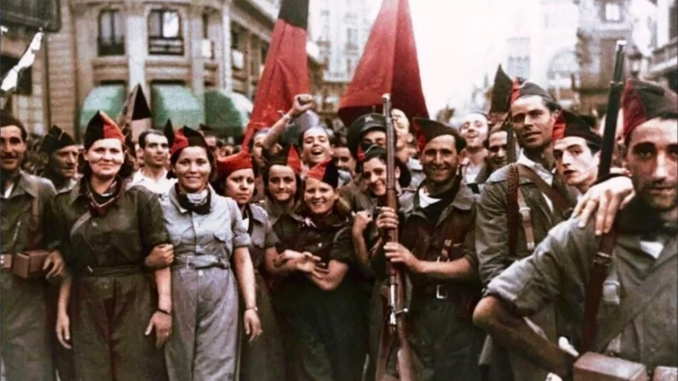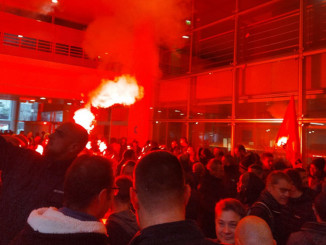
On the morning of July 17, 1936, right-wing generals in Spain ordered their troops to begin occupying dozens of towns and cities throughout the country. Over the next three days, troops loyal to right-wing army generals marched out of their barracks and attempted to occupy Spanish population centers. This was an attempted coup, designed to quickly stifle worker militancy, overwhelm the democratically-elected Republican government (Republican meaning chosen by the people, not like the Republican Party in the United States), roll back gains made by working people in the past few years, and put the generals in charge.
In some cities and regions, workers and peasants were confused. They heard rumors of a generals’ revolt, but believed their elected Republican officials who denied the rumors, or trusted regional commanders who promised that they and their troops were loyal to the Republic. The Socialist Party leadership (the Spanish Socialist Party was the dominant party in the Spanish Republican government) refused to give workers weapons, encouraged passivity, and kept workers from taking the initiative. In these instances, workers didn’t take to the streets, and weren’t able to arm themselves for defense. In only one or two days, these regions were occupied by the military, and socialists, communists, anarchists, and other organized workers were quickly rounded up and thrown in jails or killed.
In others areas and cities, however, workers took the initiative. In Barcelona, as troops marched out of the barracks and into the city center, they were greeted by only partially armed yet organized and courageous workers who had barricaded streets and set up firing positions, and ambushed rebel troops. Although hundreds were killed, after three days of tough urban fighting, the workers were victorious. They took control of their neighborhoods, workplaces, transportation, utilities, and began to make a social revolution in response to the coup. This social revolution temporarily spread to all of the state of Catalonia and the bordering state of Aragon, with the collectivization of everything from churches and farms to tractors to barber shops, and sincere attempts to create a new society based on human need rather than profit.
In Madrid and other areas, like Malaga, the Basque regions and Valencia, workers either defeated the rebellious generals’ troops in urban struggles, or surrounded and besieged army barracks before troops could even get out. Workers’ collective efforts forced the military onto the defensive, and forced soldiers to question their orders, debate political questions about their role in Spanish society, and in some cases mutiny against their officers.
By July 20 or shortly thereafter, Spain was divided into two distinct zones. One was a military zone controlled by the generals and under a state of martial law. It was from this zone that General Francisco Franco and his reactionary supporters would carry out their civil war against the elected Republican government. The Republican zone was a zone of experimentation, debate, and even division, in which different revolutionary groupings of peasants, unionists, socialists, communists and anarchists attempted radical social change, at least for the first year of the civil war.
The Spanish Civil War dragged on until 1939, when the military under Franco defeated the Republic and crushed democracy in Spain. Why and how this occurred is a longer, complex story.
But although the revolutionary forces were defeated in the long run, they were the reason the coup didn’t succeed in the first place, and they were the main reason it took nearly three years for Franco and his allies – Italy’s Mussolini and Germany’s Hitler – to defeat them. Had the Republic and those militant workers received wholehearted support from their supposed allies, they might even have been able to claim ultimate victory.
It was the organized and militant workers of Barcelona, Madrid, Malaga, Valencia and other areas who fought off the initial military uprising and fought heroically throughout the civil war to stave off defeat. Although they were ultimately overpowered, their struggle is testament to what organized workers can accomplish when they fight rather than concede in the face of a threat.
July 17, 1936. The day Spanish workers stood against military rule and fascism – and won.




